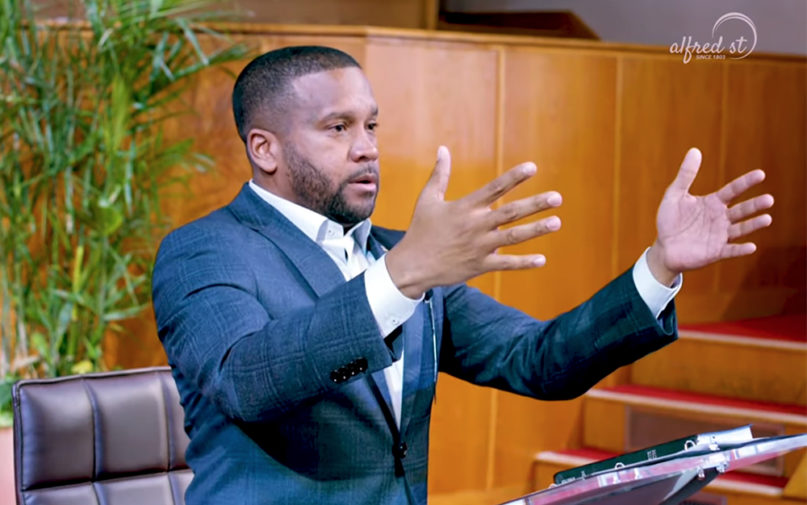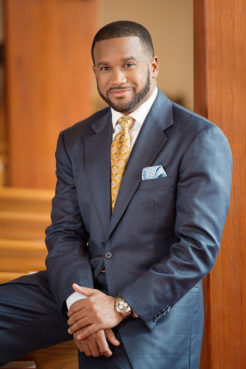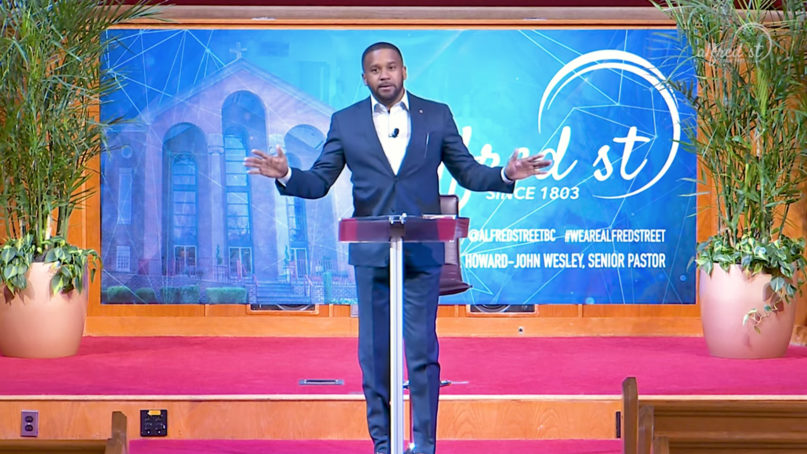(RNS) — The Rev. Howard-John Wesley made the surprise announcement to his megachurch in Alexandria, Virginia, in December: He needed to step away temporarily.
His sabbatical, originally scheduled for January to Easter, ended earlier than expected as he said he felt called by God to return to his pastoral work at Alfred Street Baptist Church. On his first weekend back, more than 15,000 viewers — from suburban Washington to South Africa — logged into broadcasts of his Palm Sunday sermon.
The fourth-generation Baptist preacher has given thousands of sermons over the last three decades but said he was ready to return to the pulpit of his 8,800-member church after having almost two full months away from his normal busy schedule.
RELATED: Click here for complete coverage of COVID-19 on RNS
Wesley, 47, talked to Religion News Service about the benefits of extended time off, the dangers of burnout for black clergy and his plans for helping his congregation through the coronavirus pandemic.
The interview has been edited for length and clarity.
You preached a Palm Sunday sermon about how affirmation of people is different than a calling of God. Did that message speak to you personally, especially given your time away from the pulpit?
It did. I realized that part of what led to me feeling distant from God was that I had surrendered to the number of members and the applause of people and felt content in that as opposed to a private prayer life.
Over the past weekend, your church held its virtual worship service, once on Saturday night and twice on Sunday. Did you preach once or several times, as you might have under previous circumstances?
We prerecord and then we just broadcast it three times thus far. So I’ve not been live on Sunday. And that’s actually good because that added to the wear and tear on my body, having to preach four times over the weekend.

The Rev. Howard-John Wesley preaches at Alfred Street Baptist Church for a streamed Palm Sunday service in Alexandria, Virginia. Video screengrab
Despite that change, is there nevertheless a danger that you could go right back to some of the patterns you had, but with even greater stress as you try to lead a megachurch through the coronavirus pandemic?
I realized that sabbatical was not about checking boxes. It’s about developing new patterns and I think I have successfully done that. I have a staff around me and a team of leaders who know what my goals are. People have stepped up to do some amazing things in my absence. The first thing I said when I came back is whatever you all were doing while I was away, you’re going to keep doing. I’m not coming back to take everything back in my hands.
RELATED: God rested. Why can’t clergy take a break?
Has your sabbatical made you proceed differently even as you help your congregation cope with the coronavirus pandemic?
Definitely. Now my mindset is that relationships matter more than anything else. And all we want to do is cater to those. All we want to do is build those. Let’s not be focused on building some megabuilding and megachurch and megaministry. Let’s work on building relationships.
When you announced your sabbatical, you mentioned bearing the weight of eulogizing members who you loved. Have you thought about how you will deal with that possible challenge as the coronavirus threatens so many and funerals can’t be held in the usual way?

The Rev. Howard-John Wesley. Photo by Dave McIntosh, courtesy of Alfred Street Baptist Church
Yeah. It makes me sad to know that we may be limited to graveside services for 10 or less. But I think the bigger thing is staying connected with these families afterwards. When it’s all over, maybe we have a memorial service for all who passed away and we call their names out and celebrate their lives in one joint — I don’t want to say funeral service — but celebration of life service.
You also said you had tired of wrestling with God as you prepared for sermons and you felt very distant from God. How would you describe your spiritual health now?
Oh wow. Overflowing with desire to preach. I’ve spent two months just reading devotionals, praying, reading the Bible. I must have mapped out at least 30 to 40 sermons. I’m excited I’ve got these little seeds of sermons that, with a little bit more work and planting, hopefully will blossom into a whole sermon tree, after that strain of sitting down on Thursday going, “Oh God, what am I going to preach on Saturday?” I’m out of that mode.
Has your physical health changed as well?
Definitely. The gym closing irks me. I was just getting into my rhythm working out at the gym three times a week, Bikram yoga twice a week and running twice a week. I’m out trying to prepare for a half-marathon. I love running. It clears my mind. I sleep better at night when I run. I failed on the diet thing. I wasn’t able to go all plant-based.
You didn’t go vegan?
I tried. Yeah, that didn’t add joy to my life. So it kind of got sacrificed. We landed in pescatarian world.
You preached at the King holiday service at Ebenezer Baptist Church in Atlanta in January. Why did you choose to do that when you were on sabbatical?
One, being a Martin Luther King scholar from Boston University, which I was in grad school, I just thought that was a huge honor for the family to ask me. And then, secondly, I did speak it over with church leadership and I asked them to pray about it. And they were OK as long as I agreed that was the only speaking engagement I would have.
One expert has told me burnout of black clergy is a “silent epidemic.” What is it about the lives and careers of black clergy that may make their situation more prone to burnout than other clergy?
One, is the black pastor has a very different relationship and role within the church than you see in Caucasian (congregations), much more authoritative. The church is much more dependent on the pastor. It has always been one of the most prestigious professions in black America. And then it’s very addictive because it feeds the ego. And the burnout may be more self-induced than a result of the church in the nature of it. It’s easy to fall, become addicted to the applause of people and them granting you that authority and speaking highly of you. And then you make yourself believe, “Oh, this is what God wants, right? This is actually what the Lord wants for me.”
And then I guess the fall is harder when you realize, “Well no, I’m still a human being.”
Yeah, the fall is harder. And unfortunately for many clergy, and I say this in a way that I hope clergy hear in the black church: We fall prey to other temptations, not necessarily burnout. We fall prey to the alcoholism. We fall prey to the philandering and the destroying of marriages with adulterous affairs. We cope with it in unhealthy ways.

The Rev. Howard-John Wesley preaches for a streamed Palm Sunday service at Alfred Street Baptist Church in Alexandria, Virginia. Video screengrab
RELATED: Black churches bucking the trend of decline
What difference did the sabbatical make for you? How are things different now for you?
Man, there’s so many answers to that. I feel much closer to the Lord. I am resting regularly. We still have building issues. We still have finances to deal with. I still have to preach. But I’m not stressed thinking about it. I’m excited to get to it and I’ll know when to say no. Just having that joy and peace back and resting at night is just the best gift I could have given myself. And I’ll tell you, for your children, to look at you and say “We got our dad back.” That was an amazing thing for me.
Did you ever sit in the back of churches and listen to sermons and if so, what struck you most about church from that perspective?
I visited six churches while I was gone for these 12 Sundays and intentionally did not tell the pastors I was coming and just kind of sat in the back and enjoyed worship. It was very different and so I want to find a way to be able to worship while I still lead worship. That’s probably going to be one of my biggest challenges coming back.
What have you planned for Easter about your message, especially in light of everything your congregation and the rest of the world is facing right now?
I am preaching from the Book of Revelation, where Christ makes an appearance, and I want to share with the church how the people that Revelation is written to are facing the exact same context that we are, with a lot of unknowns, a lot of concern, a lot of worries and fears. And in the midst of that, Christ shows up and says, “I am he who was dead and I’m alive forevermore.”
During the virtual service, you sat down in a chair some of the time and stood up some of the time. Is that a change from the past?
We wanted to create a reverent space, but not necessarily just try to do church as usual. We could be authentic to the reality that most people watch from their couch with their pajamas on. It’s going to fall in between a theological TED Talk and a traditional sermon.





